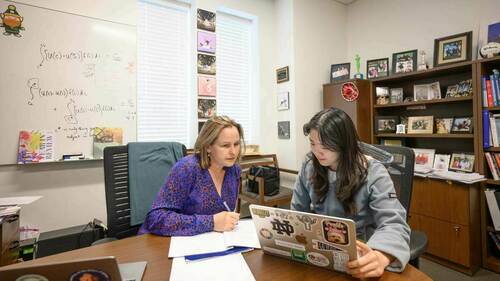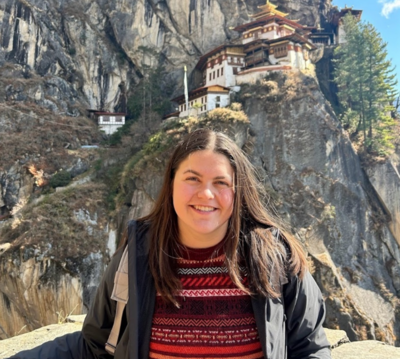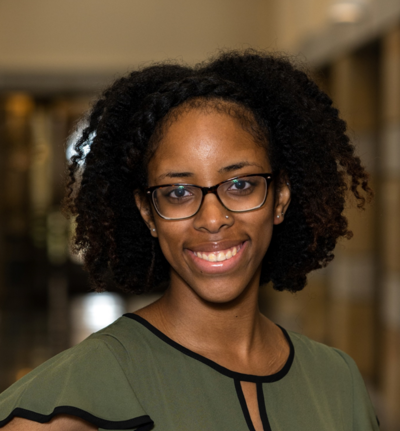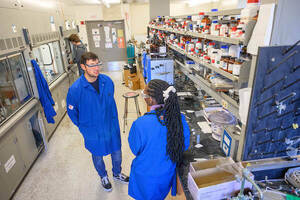
Research spans many disciplines at Notre Dame. Each college has a myriad of opportunities available for undergraduates, including students in the College of Arts and Letters.
Whether your major is Africana studies, economics, sociology, political science, or any of the expansive arts and letters programs, you'll have plenty of options to, as they say, "Study Everything" and "Do Anything."
Looking for research options, advising, or funding? The Flatley Center for Undergraduate Scholarly Engagement (CUSE) is here to help. Check out their guide for students who are ready to get started.
Featured below are two student researchers representing their majors in the program of liberal studies/economics and political science/peace studies respectively.
Through collaboration with different departments offering guidance and funding at Notre Dame, such as the Liu Institute, the Institute for Scholarship in the Liberal Arts, and the Kellogg International Scholars Program, these students took advantage of Notre Dame’s resources to dive into topics that capture their passions and interests.

Rose Quinlan '24
Majors: Program of liberal studies (PLS), economics
What I do:
I am working on a senior thesis exploring the ethical dilemmas presented by the Gross National Happiness index in Bhutan. Bhutan is a small Buddhist monarchy in the Himalayas that has chosen a unique approach to economic development.
The royal government has chosen to maximize Gross National Happiness (GNH), a metric that is calculated in an annual survey that measures several indicators of satisfaction amongst Bhutanese citizens. The GNH index has led Bhutan to pursue an agenda of economic isolationism, environmental protection, and extreme cultural preservation.
My research focuses on the ethical problems arising from Bhutan’s GNH approach, and conversely, the ethical problems arising from a more traditional or growth-centric approach to development. This includes extensive qualitative and quantitative research on Bhutan’s economic and political history, as well as research on several schools of thought surrounding happiness and developmental policy.
Thanks to the UROP Senior Thesis Grant and the Roberts Endowment for Undergraduate Research in East Asia, I was able to travel to Bhutan and interview government officials at the Center for GNH Research. I am incredibly grateful for the support of my advisor, Associate Professor Thomas Stapleford, as well as the Liu Institute and the Institute for Scholarship in the Liberal Arts (ISLA).
How I got started:
I wanted to do a project that combined my interests in philosophy and economics, so I started working with my advisor to find a topic within the debate surrounding standard-of-living metrics. I began thinking about the World Happiness Report, and I was surprised to discover that the index was inspired by a resolution submitted to the United Nations by the Kingdom of Bhutan. I knew nothing about Bhutan but became fascinated with their approach to public policy, and the idea just snowballed into a thesis from there!
What I’ve learned:
Prior to my research, I knew very little about Bhutan, and it was difficult to find reliable information about the country. I had to start by learning the basics—history, dynasties, religious beliefs—and work my way up from there. There was definitely a learning curve, but it was incredibly exciting to learn about a culture and political environment that was so different from my own.
For example, I was amazed to learn that the current King of Bhutan established a national parliament and constitution in 2008, and many Bhutanese citizens protested because they preferred the absolute monarchy. In addition, my research exposed me to the compelling philosophical controversy surrounding development, as well as the debate on happiness and how nations might try to quantify it.
Working on an independent project also helped me realize my own strengths as an individual and a student. Traveling alone in a country that is not well-suited for tourists was challenging, but rewarding, and I got to see a part of the world that many people have never heard of. The writing itself has taught me how to tackle large compositions, and as a writer, I feel that I am finding my voice as I narrate Bhutan’s unique story.

Khya Morton '24
Majors: Political science, peace studies
Minor: Italian
What I do:
I am an undergraduate research assistant for Professor Ernesto Verdeja through the Kellogg International Scholars Program. This is a competitive research program offered by the Kellogg Institute that pairs selected students with a Kellogg faculty fellow to develop and strengthen their research skills throughout their undergraduate career (sophomore to senior year).
Professor Verdeja specializes in critical theory, genocide and mass atrocities, early warning technologies, and political reconciliation. My work with him has been centered around the causes and consequences of genocide and mass atrocities as well as prevention efforts.
Currently, I am compiling a list of non-fiction books published in 2023 in preparation for the Institute for the Study of Genocide’s biennial Lemkin Book Award for the best book on genocide and mass atrocity. However, I typically complete a variety of qualitative research projects throughout the school year depending on Professor Verdeja’s upcoming policy reports, presentations, peer-reviewed articles, etc.
For instance, last semester we started a project on the United Nations Office on Genocide Prevention and the Responsibility to Protect. I was tasked with searching through the UN System to see which offices and agencies reference the 2014 Framework of Analysis for Atrocity Crimes in their publications or implement it in their operations. My research was just one aspect of a broader analysis of the functionality and influence of this UN Office on the international atrocity prevention community.
How I got started:
I took Introduction to Peace Studies with Professor Verdeja during the spring semester of my first year. His course instantly became one of my favorites because we explored so many topics that piqued my interest—the responsibility to protect, restorative versus retributive justice, and civil and human rights violations.
So, I started attending Professor Verdeja’s office hours to learn more about his academic background and research expertise because I was interested in pursuing undergraduate research in a similar field. Ultimately, he told me about the Kellogg International Scholars Program and encouraged me to apply…the rest is history!
What I’ve learned:
One of the most useful skills that I have learned from my research with Professor Verdeja is how to critically analyze and summarize scholarly sources and intergovernmental reports while detailing their significance to our research project(s).
Academic publications can be very taxing to break down and comprehend. So, I am thankful that I have had the opportunity to strengthen such an important skill, especially before entering my graduate education and career in law—which will demand strong reading comprehension, critical thinking, and analytical skills.
Regarding the content of our research, I have learned about different triggers of large-scale atrocities and violence throughout history (e.g., political, economic, and social ideologies; individual perpetrator motivations; social media disinformation). The perpetration of genocide and mass atrocities remains an unfortunate reality in our world, so I think this research is very important for the ongoing discourse on early warning frameworks and genocide prevention efforts.

Learn More
- Learn about research in the College of Arts and Letters.
- Check out the Flatley Center for Undergraduate Scholarly Engagement.
- Read about more student research experiences.
Originally published by at admissions.nd.edu on April 30, 2024.